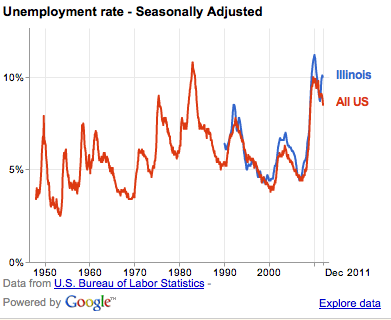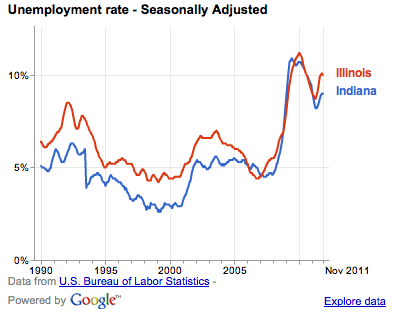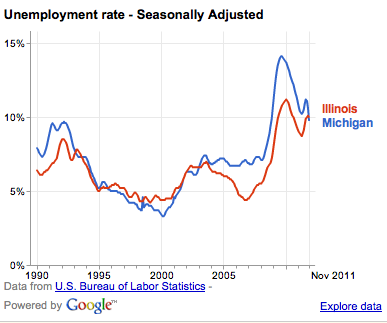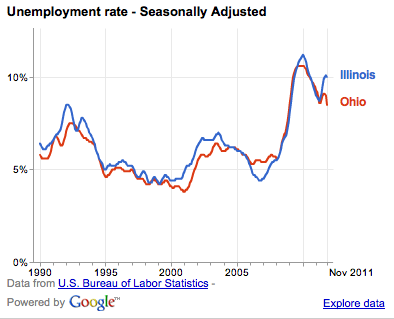* Democratic congressional candidate Tammy Duckworth has released a poll showing her with a commanding 59-17 lead over her primary opponent, Raja Krishnamoorthi. From the pollster…
Duckworth enjoys 83% name identification with 67% of the electorate rating her favorably and just 7% evaluating her unfavorably. This glowing assessment is enviable for any candidate but for one in the expensive Chicago media market, it is literally worth millions.
She leads former Illinois Deputy treasurer Raja Krishnamoorthi 59% to 17%. She holds a three-to-one margin with key constituencies: voters who say the will “definitely vote,” voters who voted in at least two Democratic primaries out of the last four, voters age 50 and older, liberals and pro-choice voters.
In addition to her solid vote support, Duckworth is also the choice of 65% of likely voters when asked who has the best chance to beat Joe Walsh in November. Just 13% opt for Krishnamoorthi.
After positives messages from both candidates are simulated, Duckworth maintains her 59% support while Krishnamoorthi is able to climb to just 23%. So while we expect the race to tighten somewhat as Krishnamoorthi communicates his message to voters he neither gains significant traction among undecided voters nor is able to cut into Duckworth’s support. It should be noted that this informed vote is nearly identical to the informed vote from our July poll, which showed Duckworth ahead 60% to 21%.
As veteran strategist David Axelrod said, “I have never seen anyone overcome a 42-point deficit this late in the race.”
Normington Petts did the poll of 400 likely Democratic primary voters. The poll was conducted January 10-12 and has a margin of error of +/- 4.9 percentage points.
* Meanwhile, for whatever reason, the House Majority PAC either didn’t test or is not releasing head-to-head November matchups in the same congressional district against Republican Joe Walsh. Politico has a bit on the PAC’s latest polling…
32% say Rep. Joe Walsh deserves reelection, his approval rating sits at just 28 percent. While there are two Democrats in the race against Walsh, PPP tested a generic opponent. Walsh trails the generic Democrat 49 percent to 35 percent.
From the PAC’s press release…
In Illinois’ 8th Congressional District, only 32% of voters think Congressman Joe Walsh deserves to be reelected, while 57% think it’s time for someone new. Congressional Republicans have a 30/57 favorability rating and only 28% of voters approve of Walsh’s job performance while 44% disapprove. Walsh trails a generic Democratic opponent 49-35 and may be the most vulnerable Republican incumbent in the country. […]
Public Policy Polling conducted this survey on behalf of House Majority PAC between January 21st and 22nd. In IL-8 500 registered voters were interviewed with a margin of error of +/-4.4%.T
…Adding… Joe Walsh now has no Republican primary opponents…
U.S. Rep. Joe Walsh of McHenry no longer has to worry about the primary election March 20 after both of his Republican challengers were removed from the ballot by the Illinois Board of Elections Tuesday.
Each of the candidates, Richard Evans and Robert Canfield, was more than 100 petition signatures short of the minimum 600 valid signatures required to run in the 8th District Republican primary, the board ruled.
*** UPDATE *** From the Krishnamoorthi campaign…
“This campaign has barely begun. If polls two months out predicted elections, Hillary Clinton would be the President, and Rick Perry would be the Republican nominee. Leaders in our district have overwhelmingly endorsed Raja as their choice and I’m confident that when voters get the chance to hear from both candidates, they’ll make Raja their nominee. Raja is the only candidate in this race with the economic experience and a detailed plan to turn our economy around by helping to create jobs for the middle class.” – Mike Murray, Deputy Campaign Manager
Mike Murray, of course, is a former Capitol Fax intern. Just thought I’d remind you again. I won’t be doing that every time I post on this race because Mike knows he’s in for the normal treatment. Still, it never hurts to remind y’all every once in a while.
28 Comments  
|
Madigan: Capital plan underfunded
Wednesday, Jan 25, 2012 - Posted by Rich Miller
* Speaker Madigan states an obvious point that few are talking about…
Democratic House Speaker Michael Madigan warned Tuesday that Illinois’ much-hyped public works program may run out of money before all of the promised construction projects can be completed.
Making a rare public speaking appearance Tuesday at Elmhurst College, Madigan said the main problem is the state has yet to launch video gambling at bars, restaurants and truck stops. That was a key funding source for the $31 billion building program Gov. Pat Quinn signed into law in 2009. […]
Spokeswoman Kelly Kraft said there is enough money to “continue the program into the foreseeable future” and added the administration has been careful to balance issuing bonds to pay for projects with available funds. […]
Madigan said he would support putting more money into the construction fund, but posed a familiar question amid the state’s ongoing budget woes: “Where do you find the money to pay for it?
The Gaming Board hates it when I say this, but they’ve dragged their feet on video gaming and that’s definitely had an impact on how much money the state can spend on capital projects. Illinois’ capital bill was by far the largest in the nation, but it’s not working as initially advertised because the video gaming law has not been put into action by the Gaming Board. Yes, there are some reasons for this. But, c’mon, guys, it’s the law of the land and it needs to be put into place.
* And speaking of gaming, Madigan was less than optimistic about the prospects for gaming expansion this spring…
Gov. Pat Quinn has voiced strong opposition to plans that would allow slot machines at Illinois racetracks, a key component to a gambling expansion plan that stalled in the legislature last year because of the governor’s opposition.
In addition, some lawmakers have questioned Chicago’s desire for a city-owned casino license.
“You’d have a two-tiered system,” Madigan said during a government forum at Elmhurst College. “You’d have the existing casinos and then you’d have a different arrangement for the Chicago casino, because it would be owned by the government. A real tough issue and I don’t know what the end of it will be. I just don’t know.”
17 Comments  
|
Madigan on governors, Lee Daniels
Wednesday, Jan 25, 2012 - Posted by Rich Miller
* The Sun-Times has a very good piece on Speaker Madigan’s speech regarding his dealings with former governors…
Madigan was most effusive in his praise for convicted former Gov. George Ryan, calling him “very flexible, very interested in just identifying problems and fashioning solutions.”
Ryan’s favorite approach was to gather all four legislative leaders in a room to work a deal, Madigan recalled. That would include Madigan; Daniels, who invited Madigan to speak and who fondly recalled the “two wonderful years” he wrested power from Madigan; former Senate President James “Pate” Philip, and former Senate Democratic leader Emil Jones.
“George would say, ‘We’ve got problems — what do we have to do to solve these problems?’ ” Madigan said. “A leader might want to evade the question, he might have a strategic plan they’re working and don’t want to answer today. And George would just pursue, persist, ‘I want an answer!’ ”
Recalling one meeting, Madigan said, “George Ryan wanted a capital program. There were going to be fee increases, tax increases. He started with me. I told him ‘I’m for it — I think you oughta make it bigger.’ He got to Pate Philip. There’s a favorite method in the Legislature with the legislative leaders. The leader doesn’t want to look at the governor and tell him ‘No.’ So they blame their caucus members: ‘Our caucus won’t agree to that.’ Pate used to refer to his caucus members as ‘gorillas.’ It’s true: ‘My gorillas don’t like that.’
“There was this pause. Ryan just looked at him and he said, ‘You said that to me after everything I’ve done for you?’ And then he took him out of the room, took him into a separate room, and closed the door. There was a lot of screaming and shouting. They both came back and sat down and George looked at Pate and Pate said, ‘Governor, there will be enough votes to pass your bill.’ That was George’s method — very effective.”
Madigan also talked about Gov. Pat Quinn a bit…
After being asked to describe the governors he’d worked with over the years, Madigan told the crowd that Quinn was “well-intentioned” and that they were working through their many differences. True to form, he didn’t outright say whether he thought Quinn was a good governor.
Instead, he called him a former political “gadfly” who became governor.
* And, by far, the most off the wall portion of Madigan’s speech was when he urged former House GOP Leader Lee Daniels to run for governor…
“Someone earlier today suggested that Lee Daniels is prepared to declare a candidacy for governor,” Madigan said. “He really would make a very good governor for the state of Illinois. Service as a governor of Illinois requires — No. 1 — that you know the operations of state government but especially the operations of the state budget, and that you be prepared to work with people when they make difficult decisions. So, Lee, give it some thought. Give it some thought.”
I could probably write ten thousand words about why I think Madigan said that, but instead I’ll turn it over to you.
20 Comments  
|
[House Speaker Michael Madigan spoke at Elmhurst College yesterday for more than an hour, then held a brief press conference afterward. He almost never does that, so this will be the first of a few posts on his speech.]
* An AP reporter was obviously quite disappointed in Speaker Madigan’s speech…
Madigan is arguably the most powerful man in Springfield, with the ability to make or break deals. But anyone hoping to find out specifically where he stands on some of the state’s most urgent issues wouldn’t have learned it from his address at Elmhurst College’s Annual Government Forum.
Changing future pension benefits for current state employees would make an interesting national debate and ultimately could be decided by the courts, he told a packed room. Illinois’ underfunded pension liability now exceeds $85 billion and lawmakers already have changed benefits for future employees to help reduce the costs.
But Madigan didn’t mention that he had introduced legislation along with House Minority Leader Tom Cross to create a three-tiered pension system for current employees, and wouldn’t address reporters’ questions afterward whether there are enough Republican and Democratic votes to bring the bill to the House floor.
School districts don’t pay into teachers’ pension systems like other employers do, leaving that obligation to the state - accounting for half of the $4 billion the state pays into five pension systems annually, he complained. He said later that it would be reasonable to ask them to pay, but would not say whether anyone was planning to introduce legislation to force them to do so.
With Madigan, however, you gotta read between the lines. For instance, here’s CBS Chicago’s take on the pension issue…
Illinois House Speaker Michael Madigan says local school districts haven’t been paying into their teachers’ retirement systems, and he thinks it may be high time that they did. […]
“In the current budget, our payment is about $4 billion – $4 billion to those five (pension) systems. One half of the $3 billion is the TRS, the Teachers Retirement System,” Madigan said. […]
“I don’t think it’s out of line to ask the local districts ‘Why don’t you contribute to this cause? These are your employees,’” Madigan said.
And here’s WBEZ’s take on the same issue…
Pension costs that are draining Illinois’ budget could be shared by local school districts.
The idea seems to be gaining steam among top Democrats, including Illinois House Speaker Michael Madigan, who gave a rare, hour-long speech at Elmhurst College Tuesday morning to talk about the challenges facing Illinois. […]
“I never found anybody who could tell me why the state of Illinois stepped up one day and said, ‘OK, school districts, we’ll just pick up all your pension costs,’” he said.
If the state made schools pay for their retired teachers, it would likely shift the cost to property taxes. It’s an idea that Senate President John Cullerton and Governor Pat Quinn have talked about, too, which means it could become part of legislation this spring.
* I listened to the full audio of the event (subscribe to hear it) and came away believing that Madigan was leaning toward this idea.
*** UPDATE *** Somehow, I missed this relevant story from Illinois Statehouse News…
llinois’ 12 percent increase in higher education spending this year isn’t going to benefit students. Instead, the additional funding for fiscal 2012 is going into the State Universities Retirement System, or SURS, to address its underfunded pension program.
“These SURS appropriations do not go to individual institutions or agencies and are not available to be used for educational purposes,” according to the footnote in a study released Monday by Illinois State University, or ISU.
SURS, which is responsible for the pensions of the state’s university employees, is facing an unfunded liability — how much it owes in benefits compared with how much assets it has on hand — of $17.2 billion, according to its 2011 annual report.
[ *** End Of Update *** ]
* On the budget stuff, however, the AP reporter was spot on. From the Chicago News Cooperative…
“We’ve got huge budget problems in this state. Why? Well, there was overspending in the past and many people engaged in the overspending. It wasn’t just one or two people,” he said.
Madigan blamed the shortfalls in part on Republicans, even though Democrats have held majorities in the House and Senate and controlled the governor’s mansion since 2002. Most budget votes, including budgets that delayed or skipped pension payments, have been carried with Democratic support.
Asked whether he should bear greater blame, having served in Illinois government in an influential position for nearly 30 years, Madigan said it took more than “one person” to drive Illinois into a pattern of spending beyond its means.
* Sen. Dillard was rather diplomatic…
Madigan accepted some of the responsibility for the state’s financial woes. He said the legislature spent more than the state took in during many budget cycles, which led to the state owing millions of dollars in unpaid bills. Madigan has been House Speaker since 1983, with the exception of two years when Lee Daniels, an adjunct faculty member in Elmhurst College’s political science department, was speaker. As speaker, Madigan controls what bills come to the House floor, but said he was “one of many” who signed off on overspending.
“There are plenty of legislators from both parties who would rather spend than cut,” Madigan said following the event.
Sen. Kirk Dillard, a Hinsdale Republican, agreed with Madigan that there are numerous state lawmakers who share the blame for the state’s economic problems. He said he commends Madigan for shouldering some of the responsibility, but added that Madigan has been the one constant in the Illinois legislature throughout the economic decline.
Discuss.
12 Comments  
|
Question of the day
Wednesday, Jan 25, 2012 - Posted by Rich Miller
* From a recent op-ed by Dick Ingram, the executive director of the Teachers’ Retirement System of Illinois…
The facts are indisputable. Over the next 30 years, the state will owe retirees in excess of $140 billion, but Illinois has less than $54 billion in the bank right now to meet those long-term obligations. The “unfunded” portion of that liability creates tremendous pressure on state government because it essentially triples the annual cost of public pensions to taxpayers; money that could be spent on other services.
Despite what you may read elsewhere, the real problem here is not the actual cost of annual retirement benefits. It’s the amount the state owes to the future.
* The Question: Do you think the state should follow national norms and strive to have 90 percent of the next 30 years of pension payments on hand right now? Explain.
35 Comments  
|
*** UPDATED x1 *** Today’s Illinois charts
Wednesday, Jan 25, 2012 - Posted by Rich Miller
* Google has a great analytical tool that you can use to compare unemployment rates over the years. I’ve done screen caps to make them easier to load. Here is the US rate since 1950, for instance…

* And here’s the Illinois rate since 1990…

That last, big upward unemployment rate spike starts in April of 2011. You can’t see it so well here, but go to the site and check it yourself.
* Now, we overlay Illinois onto the US chart…

Notice how the Illinois rate spikes in 2011, while the US rate declines.
* So, I started comparing Illinois to other states. Here’s Indiana…

Indiana also has a 2011 upward spike, but it’s smaller than Illinois’ - at least, so far.
* Michigan…

Their rate heads down while ours goes up.
* Ohio…

* To make a long story slightly shorter, I went through every state last night and compared them to Illinois. Nowhere did I see the same sort of upward unemployment rate spike in 2011 that we saw in Illinois.
It’s not absolute proof that the January, 2011 income tax hike pushed up the unemployment rate here. The Illinois rate actually went down in December by two tenths of a point, which isn’t showing up on the above charts. And the unemployment rate can mean different things at different times (more people encouraged by the climate and returning to the job market, for instance). But it sure as heck is interesting.
* A commenter linked to this chart yesterday. It’s from the Illinois Department of Public Health and shows Illinois births to unmarried women over the years. Ratios are per 1,000 live births. So, the 2009 ratio of 407.6 is 40.76 percent of all live births…
|
Year
|
Total
Live Births |
Unmarried Women |
| Number |
Ratio |
|
2009
|
171,077
|
69,728
|
407.6
|
|
2008
|
176,634
|
71,836
|
406.7
|
|
2007
|
180,530
|
72,385
|
401.0
|
|
2006
|
180,503
|
69,912
|
387.3
|
|
2005
|
178,872
|
66,266
|
370.5
|
|
2004
|
180,665
|
65,507
|
362.6
|
|
2003
|
182,393
|
64,358
|
352.9
|
|
2002
|
180,555
|
62,860
|
348.1
|
|
2001
|
184,022
|
63,426
|
344.7
|
|
2000
|
185,003
|
63,823
|
345.0
|
|
1999
|
182,027
|
62,045
|
340.9
|
|
1998
|
182,503
|
62,163
|
340.6
|
|
1997
|
180,649
|
60,401
|
334.4
|
|
1996
|
183,079
|
61,706
|
337.0
|
|
1995
|
185,801
|
62,825
|
338.1
|
|
1994
|
189,182
|
64,887
|
343.0
|
|
1993
|
190,709
|
65,086
|
341.3
|
|
1992
|
190,923
|
63,863
|
334.5
|
|
1991
|
194,066
|
63,172
|
325.5
|
|
1990
|
195,499
|
62,052
|
317.4
|
|
1989
|
190,247
|
58,866
|
309.4
|
|
1988
|
184,708
|
54,381
|
294.4
|
|
1987
|
180,441
|
50,611
|
280.5
|
|
1986
|
176,567
|
47,817
|
270.8
|
|
1985
|
180,657
|
46,453
|
257.1
|
|
1984
|
179,216
|
44,796
|
250.0
|
|
1983
|
178,820
|
42,893
|
239.9
|
|
1982
|
183,564
|
42,638
|
232.3
|
|
1981
|
184,897
|
42,352
|
229.1
|
|
1980
|
189,941
|
42,749
|
225.1
|
|
1979
|
184,184
|
40,396
|
219.3
|
|
1978
|
174,397
|
36,161
|
207.3
|
|
1977
|
177,148
|
35,528
|
200.6
|
|
1976
|
170,181
|
33,075
|
194.4
|
|
1975
|
169,248
|
31,503
|
186.1
|
|
1974
|
168,991
|
28,970
|
171.4
|
|
1973
|
168,992
|
29,782
|
176.2
|
|
1972
|
177,848
|
29,971
|
168.5
|
|
1971
|
195,311
|
29,205
|
149.5
|
|
1970
|
205,203
|
27,655
|
134.8
|
|
1969
|
195,699
|
23,862
|
121.9
|
|
1968
|
193,261
|
21,735
|
112.5
|
|
1967
|
195,644
|
20,147
|
103.0
|
|
1966
|
201,284
|
19,140
|
95.1
|
|
1965
|
208,063
|
18,216
|
87.6
|
|
1964
|
222,259
|
16,881
|
76.0
|
|
1963
|
224,787
|
16,015
|
71.2
|
|
1962
|
230,484
|
15,678
|
68.0
|
|
1961
|
237,051
|
15,546
|
65.6
|
|
1960
|
238,760
|
14,385
|
60.2
|
|
1959
|
239,871
|
14,043
|
58.5
|
|
1958
|
234,712
|
12,626
|
53.8
|
|
1957
|
238,579
|
12,055
|
50.5
|
|
1956
|
229,571
|
11,312
|
49.3
|
|
1955
|
220,541
|
10,625
|
48.2
|
|
1954
|
217,229
|
9,809
|
45.2
|
|
1953
|
206,813
|
8,742
|
42.3
|
|
1952
|
205,438
|
7,916
|
38.5
|
|
1951
|
201,082
|
7,425
|
36.9
|
|
1950
|
189,640
|
6,836
|
36.0
|
Discuss.
*** UPDATE *** From the Sun-Times…
Abortions reported in Illinois reached a 37-year low in 2010, a drop that abortion opponents attributed to more women shying away from the procedure while abortion-rights supporters pointed to an uptick in use of contraceptives.
In 2010, there were 41,859 abortions in Illinois, according to recently published data from the state Department of Public Health .
That’s the lowest total since 1973, when Illinois recorded 32,760 abortions. That’s the year the procedure was legalized in the United States in the landmark Roe vs. Wade decision by the U.S. Supreme Court.
91 Comments  
|
|
Comments Off  
|
|
Comments Off  
|
This just in… Cellini won’t get new trial
Wednesday, Jan 25, 2012 - Posted by Rich Miller
[Bumped up to Wednesday morning for visibility.]
* TUESDAY - 4:50 pm - A federal judge has decided there will be no new trial for Bill Cellini.
A bit of background for those who’ve been living under a rock…
Cellini was found guilty in November of attempting to extort money from a Hollywood producer for then governor Rod Blagojevich’s campaign.
After the trial, the Chicago Tribune discovered one of the jurors on his case didn’t disclose her felony record as required on juror questionnaires.
* 6:09 pm - And here’s why…
U.S. District Judge James Zagel offered a strong defense of Chiles in his remarks.
“While Chiles may have had contempt for defense counsel, what Chiles didn’t have was contempt for the law,” the judge said.
Regarding Chiles’ tumultuous testimony, Zagel said her “buttons were pushed” and she did not have the luxury of having been prepared to handle aggressive questioning by Cellini’s lawyer. He also noted her lack of sophistication and education.
Zagel found that Chiles did not lie on jury questionnaires she filled out and that her failure to disclose her criminal history under direct questioning from him during jury selection was not deliberate.
She showed no bias toward Cellini in any way, the judge ruled.
26 Comments  
|
|
 Support CapitolFax.com
Support CapitolFax.com
Visit our advertisers...
  ...............
...............
 ...............
...............
 ...............
...............
 ...............
...............
 ...............
...............
 ...............
...............
 ...............
...............
 ...............
...............


|
   
|
Hosted by MCS |
SUBSCRIBE to Capitol Fax |
Advertise Here |
Mobile Version |
Contact Rich Miller
|
























